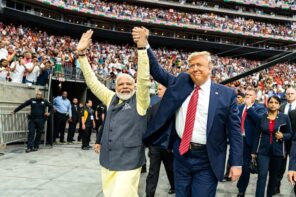Every new day reveals fresh hints of Joe Biden’s wish to be remembered as a winning war president, as he contests rising Chinese power on every front while also arming Zelensky and Netanyahu to the teeth and backing their wars with high-tech tactical support. If there weren’t actual threats to U.S. security Biden would have to invent them.
Biden and his team see this pugilistic posture as his best path to reelection, given how the voters refuse to give him much credit for a rebounding job-rich economy. Politicians do what politicians do. No one should be surprised that Biden would even stoop to discounting the credibility of the health ministry of Gaza on civilian deaths.
I’m not here to trash Biden but to probe the psychology of the vast numbers of White Americans whose peace of mind appears to rest on the consoling idea of American global dominance, who glory in the extravaganza that is our trillion-dollar military budget, and who are only too willing to think of this deeply troubled country as “the indispensable nation.” These are not people whose sleep is troubled by the deaths of faraway children.
None of this is new, of course. Think back to the era of Teddy Roosevelt’s “Big Stick” and his aptly named Great White Fleet. But the imperial fever comes and goes. It cooled dramatically in the wake of World War I’s bloody trenches. The other Roosevelt had to tread lightly in order to reawaken martial spirit in a country that had tasted quite enough battlefield carnage just a generation earlier.
Fast forward to the Cold War years and it’s a different kind of militarism, one rooted in bone-deep fear of the Soviet Menace and nuclear annihilation. But while we had no intention of ever disarming again, most White Americans did not relish the idea of playing world policeman. Many worried openly about the cost. Think here of Dwight Eisenhower, the former Supreme Allied Commander, anguishing in public about the cancerous growth of a military-industrial complex.
But there were some who never worried about the cost, who even salivated at the thought of all-out war between The Forces of Righteousness and the Great Satan of Communist Russia. Eisenhower’s secretary of state, John Foster Dulles, exhibited mild symptoms of such a Manichaean outlook. But Dulles, a dour and dutiful high-caste Presbyterian, had no inkling of the very rapid growth in those years of a militant blood-and-soil ideology within the swamplands of evangelical Christianity.
Dozens of scholars have now described in detail how the spread of this blood-and-soil religion intersected with Cold War corporatist politics; how it also embodied White racial anxiety in the face of a rising civil rights movement; and even how the risk of nuclear Armageddon served to heighten rather than mute the appeal of a violence-saturated Christian apocalypticism.
As its apostles and propagandists well understood, this blood-and-soil Christianity had roots reaching all the way down to the founding American myths: to the occupation of an imaginary unoccupied “wilderness” by righteous White settlers to Thomas Jefferson’s racist wet dream of an “Empire of Liberty,” etc.
By the late 20th century these apostles were able to exploit White men’s gnawing sense that they were losing control of things: control of their women, control of people of color, and control over their status as fortunate sons within the postwar industrial economy. By the middle of the 1970s White males were already losing good manufacturing jobs as the capitalists moved production to low-wage havens. Their country had somehow lost a long and costly war in Southeast Asia. Then came further humiliation at the hands of the Iranian mullahs. Women and queer people were openly violating the patriarchal norms. These were the nightmare years for White masculinism on a variety of fronts.
White men needed vindication. They got some of it in the person of Ronald Reagan. But they also got it in the form of Jerry Falwell and Pat Robertson and James Dobson and Phyllis Schlafly and a renewed onslaught of hardass religion that included a conservative Catholic reaction to Vatican II reforms and an explosive growth in Christian Zionism. The older meek and mild Jesus gave way to a militant Jesus rising up to fight his foes: the fusion of Jesus and John Wayne that Kristin Kobes Du Mez and Katherine Stewart write about.
The 1980s provocateurs channeled White Christian rage into an array of nasty culture wars. But culture war skirmishing couldn’t really satisfy the sadism, the urge to totally annihilate the enemy. And in this respect the 1989 collapse of the old Soviet Union posed a problem: what would happen to the American psyche, the American will to fight, in the absence of a worthy external threat?
Tom Englehardt raised this question almost 30 years ago in The End of Victory Culture in which he argues that the dissolution of the Soviet Union would finally tamp down the violent impulses lying at the deepest layers of the national psyche. Alas, even an always-perceptive Englehardt could not, in 1995, feel the full force of the surging dominionist current within White evangelicalism or the extent to which the marginalization of millions of White men would fuel a violent revenge ideation. He certainly could not predict what the massive humiliation of the 9/11 attacks would engender: a need to feel invincible again through deadly demonstrations of shock and awe. He could not possibly know how the sight of a Black man sitting in the Oval Office would revive long standing fears about the waning of White supremacy.
Today we see the return of a victory culture everywhere around us. We see it in widespread public support for using any means necessary to bring down Putin; for an out-and-out economic duel to the death with Xi’s China; and for liquidating anyone whom we choose to brand as “terrorists.” We see it in the proliferating efforts to demonize trans people and stamp out any possibility for a happy and healthy trans life. We see it in the shift in public opinion regarding crime and policing: abandoning promising early steps toward a community health model for public safety and reviving support for the old lock ‘em up approach (and human rights be damned).
Parson David Brooks sees only personal moral disintegration in the coarseness, casual violence, and indifference to monumental cruelty that these days present us with. I think the source lies deeper, in a religion so poisoned by White grievance and victory culture that it’s entirely lost sight of what is actually sacred in this world.
To go back to the politics: If Biden is able to ride to reelection on the back of a revived victory culture, he will owe this personal victory in part to the fear and rage being stoked every Sunday in many, many thousands of White Christian churches, where Technicolor visions of the End Times-struggle keep packing them in, week after week. This substratum has been heavily Trumpian, needless to say; Team Biden is looking to peel off the ones who question DJT’s lack of enthusiasm for foreign military engagement (failing to recognize, perhaps, that many of those tack even further Right).
In a country where religious life is envisioned as a battlefield and where horrific violence is seen to serve a redemptive function, it is not all that hard to generate a politics and a foreign policy centered on the exercise of overwhelming force. Whether our already overstressed planet, not to mention our basic humanity, can survive much more of this kind of force is a question we all might ponder.





